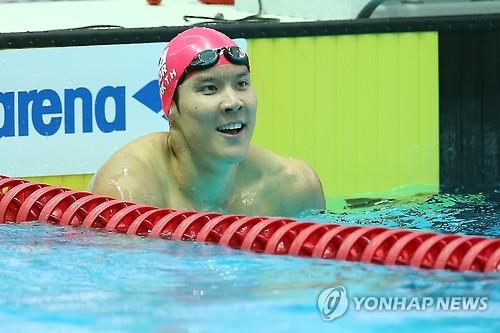- California Assembly OKs highest minimum wage in nation
- S. Korea unveils first graphic cigarette warnings
- US joins with South Korea, Japan in bid to deter North Korea
- LPGA golfer Chun In-gee finally back in action
- S. Korea won’t be top seed in final World Cup qualification round
- US men’s soccer misses 2nd straight Olympics
- US back on track in qualifying with 4-0 win over Guatemala
- High-intensity workout injuries spawn cottage industry
- CDC expands range of Zika mosquitoes into parts of Northeast
- Who knew? ‘The Walking Dead’ is helping families connect
Park Tae-hwan headed to Rio Olympics following CAS ruling
SEOUL, July 8 (Yonhap) — South Korean swimmer Park Tae-hwan is headed to Rio de Janeiro for his fourth Summer Olympics after winning a legal battle that dragged on for months.
The Court of Arbitration for Sport (CAS) on Friday ruled that the formerly banned swimmer is eligible for the Summer Games, granting Park’s earlier request for provisional measures. Park had filed an appeal against the Korean Olympic Committee (KOC) over the latter’s ban on the athlete participating in Rio.
Provisional measures are sought by parties needing immediate decisions on eligibility, pending a final decision.
“(Park) is eligible for selection to compete in international competitions, including the 2016 Olympic Games, until such time as a final decision is rendered in this procedure,” the CAS decision read.
The KOC bars athletes from competing for South Korea for three years after the completion of their doping suspension.
The ruling gives Park, the 2008 Olympic champion in the 400m free, just enough time to make the national team. He was left off the preliminary roster announced on May 11, even after meeting the Olympic qualifying times in the 100m, 200m, 400m and 1,500m freestyle at the national team trials in April. The deadline to submit the final roster to FINA, the international swimming governing body, is Friday local time in Lausanne, Switzerland.
Park tested positive for testosterone in October 2014, and his 18-month ban, which began retroactively in September 2014, ended in March this year.
Last week a Seoul court also ruled Park eligible to make the national team for Rio, saying the KOC had no grounds to ban him from the Olympics.
The local court granted an injunction requested earlier by Park’s legal representatives to secure the binding power of a CAS ruling in favor of the swimmer.

In this file photo taken on April 28, 2016, South Korean swimmer Park Tae-hwan reacts after completing the 100m freestyle final at the national team trials in Gwangju. (Yonhap)
The KOC said it will respect the decisions by both the Seoul court and the CAS and will name Park to the national team.
In a board meeting held earlier Friday, the KOC decided it would wait for the CAS decision before taking further steps on Park’s status.
Now that the CAS has ruled in favor of Park, the KOC will also discuss amending the controversial rule that had kept Park off the team.
In a statement, the KOC said it was “unfortunate” that the controversy surrounding Park’s national team eligibility had divided the nation, and that it will continue to help raise awareness of doping in international sports.
“We respect efforts by the World Anti-Doping Agency to apply unified standards on doping violations, but we also believe the penalties for doping, which seriously infringes on good sportsmanship and fairness, need to be strengthened,” the KOC said. “We plan to propose these ideas to the WADA and the International Olympic Committee.”
For months, the KOC had defied mounting public pressure and maintained it wouldn’t make any exception to its rules, even for an iconic athlete like Park, the only South Korean swimmer with an Olympic medal and a world championship.
On Friday, the KOC reiterated that it “doesn’t agree with the notion” that Park should have been allowed to compete simply based on his chances of winning medals.
“In order for Korea to develop into an advanced sports nation, we should no longer be obsessed with winning medals,” it added. “We maintain the position that national team athletes must be selected based on sportsmanship in ways that are acceptable to the people.”
The KOC was panned for unfairly punishing Park twice for the same offense, and its critics said the principle of double punishment runs counter to international standards.
The CAS decision on Park shouldn’t come as a surprise, given a precedent on double punishment.
In 2011, the CAS ruled against the International Olympic Committee’s “Osaka Rule,” which barred athletes with a doping suspension of at least six months from competing in the following Olympics. The CAS said the Osaka Rule, adopted in 2008, was “a violation of the IOC’s own statute and is therefore invalid and unenforceable.”












thomas
July 17, 2016 at 6:34 PM
I empathize with Park but this decision undermines the strength and credibility of the KOC. It also emboldens those who cheat and those whose parents paid or bribed officials to get their son/daughter on to the national team.